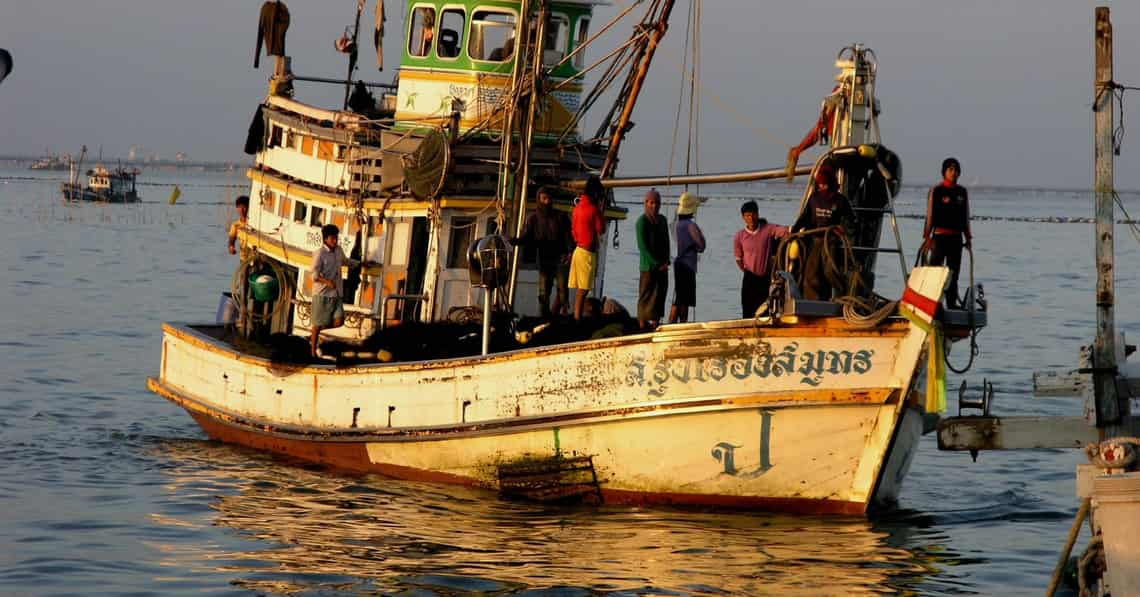A recent six-month investigation by The Guardian has revealed the extent of the brutal slavery that drives Thailand’s seafood industry.
This is not a new issue. Indeed, the Environmental Justice Foundation (EJF) provided a thorough report of their own last year. However, the Guardian’s groundbreaking investigation has, for the first time, clearly established exactly how supply chains link Thai slave ships to international supermarkets in the United States and United Kingdom, including heavy hitters like Tesco, Walmart, Costco and Carrefour.
Here’s how it goes: ships trawling international waters off the coast of Thailand are pulling in large amounts of “trash fish” (inedible to humans) which are then ground down into fishmeal and sold to Thailand-based, quadrillion baht business Charoen Pokphand or CP Foods. CP then sells and ships its farmed prawns to international customers like the supermarket chains mentioned above.
Despite the sky high revenues that ensue, the men who actually do the hard labour are paid nothing. They are, by any definition, slaves.
The Life of a Modern Slave
Most of the slaves working on the ships are migrant workers and/or victims of trafficking from neighbouring countries like Burma and Cambodia. Trafficking victims are often tricked by brokers’ false promises of “good” factory jobs, then forced onto fishing boats and beaten into submission. There they are trapped, bought and sold like livestock, and held against their will for months or years at a time, where they are forced to work grueling 22-hour days in dangerous conditions.
The stories they tell are heartbreaking. Those who resist or try to run away are beaten, tortured, and often killed. One man, who had been trafficked from Burma, reported seeing about 20 other slaves murdered before his eyes, including one who was literally torn apart, his feet and arms attached to four different ships moving in opposite directions.
Unsurprisingly, suicide on the slave ships is common.
Global Consequences
According to the Global Slavery Index’s 2013 report, “Thailand has the highest estimated prevalence of modern slavery in the South-East Asia area.” The report cites the seafood industry as a major contributor. “Thailand is one of the world’s leading seafood suppliers producing 4.2 million tonnes of seafood per year, 90% of which is exported,” reads the report. “The industry has seen an explosive growth in recent years due to increased demand from the international market (mainly Europe and the U.S.) which has led to an increased need for, and subsequent use of, cheap migrant labour.”
Due in part to the Guardian’s findings, the U.S. State Department has just relegated Thailand to the lowest rank, Tier 3, in their Trafficking in Persons report. The annual report ranks countries on their governments’ perceived effort to acknowledge and respond to issues of human trafficking. The Tier 3 ranking is reserved for countries that do not meet the minimum standards and have not shown any significant efforts to do so. Thailand is now considered to be one of those countries.
This demotion could lead to economic sanctions for Thailand as well as a loss of development aid, which will hopefully be the kick the Thai government needs to start cracking down on the very real slavery and trafficking problems within the country.
UPDATE: The Thai Labour Ministry has responded by announcing plans to cooperate with the International Labour Organisation to start complying with good labour practices and improving conditions in workplaces run by around 200 different seafood operators in the country. The primary goal is to improve Thailand’s international image, since negative views of Thailand affect the bottom line on big business.
What Can You Do?
- Educate yourself: Watch the videos above, Supermarket Slave Trail and Sold to the Sea to hear first-hand accounts from former slaves and learn more about the current situation.
- Speak out: sign petitions, post and share on social media, discuss the issue.
- Be a conscientious consumer: Should you boycott prawns? Human Rights Watch and the National Fisheries Institute say that it may be counterproductive. But being more aware of where your food is coming from is important.
